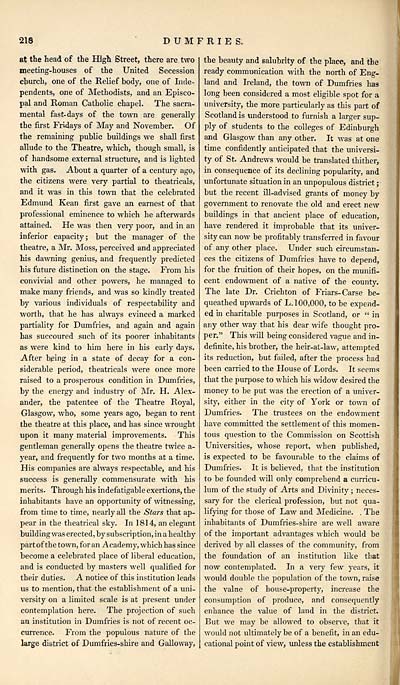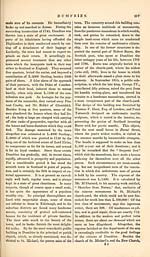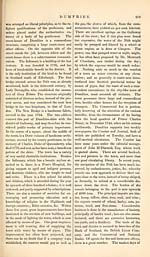Gazetteer of Scotland > Volume 1
(248) Page 218
Download files
Complete book:
Individual page:
Thumbnail gallery: Grid view | List view

218
DUMFRIES.
at the head of the High Street, there are two
meeting-houses of the United Secession
church, one of the Relief body, one of Inde-
pendents, one of Methodists, and an Episco-
pal and Roman Catholic chapel. The sacra-
mental fast- days of the town are generally
the first Fridays of May and November. Of
the remaining public buildings we shall first
allude to the Theatre, which, though small, is
of handsome external structure, and is lighted
with gas. About a quarter of a century ago,
the citizens were very partial to theatricals,
and it was in this town that the celebrated
Edmund Kean first gave an earnest of that
professional eminence to which he afterwards
attained. He was then very poor, and in an
inferior capacity; but the manager of the
theatre, a Mr. Moss, perceived and appreciated
his dawning genius, and frequently predicted
his future distinction on the stage. From his
convivial and other powers, he managed to
make many friends, and was so kindly treated
by various individuals of respectability and
worth, that he has always evinced a marked
partiality for Dumfries, and again and again
has succoured such of its poorer inhabitants
as were kind to him here in his early days.
After being in a state of decay for a con-
siderable period, theatricals were once more
raised to a prosperous condition in Dumfries,
by the energy and industry of Mr. H. Alex-
ander, the patentee of the Theatre Royal,
Glasgow, who, some years ago, began to rent
the theatre at this place, and has since wrought
upon it many material improvements. This
gentleman generally opens the theatre twice a-
year, and frequently for two months at a time.
His companies are always respectable, and his
success is generally commensurate with his
merits. Through his indefatigable exertions, the
inhabitants have an opportunity of witnessing,
from time to time, nearly all the Stars that ap-
pear in the theatrical sky. In 1814, an elegant
building was erected, by subscription, in a healthy
part of the town, for an Academy, which has since
become a celebrated place of liberal education,
and is conducted by masters well qualified for
their duties. A notice of this institution leads
us to mention, that the establishment of a uni-
versity on a limited scale is at present under
contemplation here. The projection of such
an institution in Dumfries is not of recent oc-
currence. From the populous nature of the
large district of Dumfries-shire and Galloway,
the beauty and salubrity of the place, and the
ready communication with the north of Eng-
land and Ireland, the town of Dumfries has
long been considered a most eligible spot for a
university, the more particularly as this part of
Scotland is understood to furnish a larger sup-
ply of students to the colleges of Edinburgh
and Glasgow than any other. It was at one
time confidently anticipated that the universi-
ty of St. Andrews would be translated thither,
in consequence of its declining popularity, and
unfortunate situation in an unpopulous district ;
but the recent ill-advised grants of money by
government to renovate the old and erect new
buildings in that ancient place of education,
have rendered it improbable that its univer-
sity can now be profitably transferred in favour
of any other place. Under such circumstan-
ces the citizens of Dumfries have to depend,
for the fruition of their hopes, on the munifi-
cent endowment of a native of the county.
The late Dr. Crichton of Friars- Carse be-
queathed upwards of L. 100,000, to be expend-
ed in charitable purposes in Scotland, or " in
any other way that his dear wife thought pro-
per." This will being considered vague and in-
definite, his brother, the heir-at-law, attempted
its reduction, but failed, after the process had
been carried to the House of Lords. It seems
that the purpose to which his widow desired the
money to be put was the erection of a univer-
sity, either in the city of York or town of
Dumfries. The trustees on the endowment
have committed the settlement of this momen-
tous question to the Commission on Scottish
Universities, whose report, when published,
is expected to be favourable to the claims of
Dumfries. It is believed, that the institution
to be founded will only comprehend a curricu-
lum of the study of Arts and Divinity ; neces-
sary for the clerical profession, but not qua-
lifying for those of Law and Medicine. , The
inhabitants of Dumfries-shire are well aware
of the important advantages which would be
derived by all classes of the community, from
the foundation of an institution like that
now contemplated. In a very few years, it
would double the population of the town, raise
the value of house-property, increase the
consumption of produce, and consequently
enhance the value of land in the district.
But we may be allowed to observe, that it
would not ultimately be of a benefit, in an edu-
cational point of view, unless the establishment
DUMFRIES.
at the head of the High Street, there are two
meeting-houses of the United Secession
church, one of the Relief body, one of Inde-
pendents, one of Methodists, and an Episco-
pal and Roman Catholic chapel. The sacra-
mental fast- days of the town are generally
the first Fridays of May and November. Of
the remaining public buildings we shall first
allude to the Theatre, which, though small, is
of handsome external structure, and is lighted
with gas. About a quarter of a century ago,
the citizens were very partial to theatricals,
and it was in this town that the celebrated
Edmund Kean first gave an earnest of that
professional eminence to which he afterwards
attained. He was then very poor, and in an
inferior capacity; but the manager of the
theatre, a Mr. Moss, perceived and appreciated
his dawning genius, and frequently predicted
his future distinction on the stage. From his
convivial and other powers, he managed to
make many friends, and was so kindly treated
by various individuals of respectability and
worth, that he has always evinced a marked
partiality for Dumfries, and again and again
has succoured such of its poorer inhabitants
as were kind to him here in his early days.
After being in a state of decay for a con-
siderable period, theatricals were once more
raised to a prosperous condition in Dumfries,
by the energy and industry of Mr. H. Alex-
ander, the patentee of the Theatre Royal,
Glasgow, who, some years ago, began to rent
the theatre at this place, and has since wrought
upon it many material improvements. This
gentleman generally opens the theatre twice a-
year, and frequently for two months at a time.
His companies are always respectable, and his
success is generally commensurate with his
merits. Through his indefatigable exertions, the
inhabitants have an opportunity of witnessing,
from time to time, nearly all the Stars that ap-
pear in the theatrical sky. In 1814, an elegant
building was erected, by subscription, in a healthy
part of the town, for an Academy, which has since
become a celebrated place of liberal education,
and is conducted by masters well qualified for
their duties. A notice of this institution leads
us to mention, that the establishment of a uni-
versity on a limited scale is at present under
contemplation here. The projection of such
an institution in Dumfries is not of recent oc-
currence. From the populous nature of the
large district of Dumfries-shire and Galloway,
the beauty and salubrity of the place, and the
ready communication with the north of Eng-
land and Ireland, the town of Dumfries has
long been considered a most eligible spot for a
university, the more particularly as this part of
Scotland is understood to furnish a larger sup-
ply of students to the colleges of Edinburgh
and Glasgow than any other. It was at one
time confidently anticipated that the universi-
ty of St. Andrews would be translated thither,
in consequence of its declining popularity, and
unfortunate situation in an unpopulous district ;
but the recent ill-advised grants of money by
government to renovate the old and erect new
buildings in that ancient place of education,
have rendered it improbable that its univer-
sity can now be profitably transferred in favour
of any other place. Under such circumstan-
ces the citizens of Dumfries have to depend,
for the fruition of their hopes, on the munifi-
cent endowment of a native of the county.
The late Dr. Crichton of Friars- Carse be-
queathed upwards of L. 100,000, to be expend-
ed in charitable purposes in Scotland, or " in
any other way that his dear wife thought pro-
per." This will being considered vague and in-
definite, his brother, the heir-at-law, attempted
its reduction, but failed, after the process had
been carried to the House of Lords. It seems
that the purpose to which his widow desired the
money to be put was the erection of a univer-
sity, either in the city of York or town of
Dumfries. The trustees on the endowment
have committed the settlement of this momen-
tous question to the Commission on Scottish
Universities, whose report, when published,
is expected to be favourable to the claims of
Dumfries. It is believed, that the institution
to be founded will only comprehend a curricu-
lum of the study of Arts and Divinity ; neces-
sary for the clerical profession, but not qua-
lifying for those of Law and Medicine. , The
inhabitants of Dumfries-shire are well aware
of the important advantages which would be
derived by all classes of the community, from
the foundation of an institution like that
now contemplated. In a very few years, it
would double the population of the town, raise
the value of house-property, increase the
consumption of produce, and consequently
enhance the value of land in the district.
But we may be allowed to observe, that it
would not ultimately be of a benefit, in an edu-
cational point of view, unless the establishment
Set display mode to: Large image | Transcription
Images and transcriptions on this page, including medium image downloads, may be used under the Creative Commons Attribution 4.0 International Licence unless otherwise stated. ![]()
| Gazetteers of Scotland, 1803-1901 > Gazetteer of Scotland > Volume 1 > (248) Page 218 |
|---|
| Permanent URL | https://digital.nls.uk/97427338 |
|---|
| Description | Volume I: Abbey to Glenartney. |
|---|---|
| Attribution and copyright: |
|
| Description | By Robert Chambers and William Chambers. Glasgow: Blackie & Son, 1838. 2 volumes. |
|---|---|
| Shelfmark | NF.1461.g.7 |
| Additional NLS resources: | |

